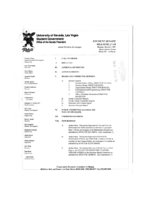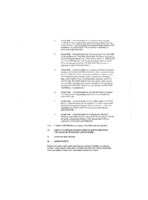Search the Special Collections and Archives Portal
Search Results
Tomiyasu Family Photograph Collection
Identifier
Abstract
The Tomiyasu Family Photograph Collection (approximately 1908 to 1991) consists of black-and-white photographic prints of the Tomiyasu family and their farming business in southern Nevada.
Archival Collection
Pearl Francis Neeley Photograph Collection
Identifier
Abstract
The Pearl Francis Neeley Photograph Collection (approximately 2000-2024) consists of digital reproductions of Francis and Neeley family photographs taken from approximately 1890 to 1945 throughout Central and Southern Nevada. Notable locations include Pioche, Eagle Valley, Spring Valley, and Las Vegas, Nevada. Also included in the collection is a digital reproduction of an autobiographical typescript by Neeley titled “My Life History,” and a multipart audio recording of Neeley recollecting her experiences growing up in rural Nevada and other events in her life. This collection consists entirely of digital surrogates.
Archival Collection
Ronzone Family Papers
Identifier
Abstract
Ronzone Family Papers (1900-1991) include newspaper clippings, business documents, correspondence, certificates, yearbooks, publications, artifacts, and photographs. The papers document their lives in Nevada, their department store, and Dick Ronzone's involvement in local politics.
Archival Collection
Mabel Hoggard Papers
Identifier
Abstract
The Mabel Hoggard Papers (1903-2011) contain materials related to Hoggard's career as a Las Vegas, Nevada elementary school teacher, her research and civic interests in Las Vegas's predominantly African American Westside communities, and her engagement with civil rights issues. The collection also contains materials about Hoggard's life, including biographical newspaper articles about her childhood, education, work, and family. The collection includes lesson plans, scrapbooks, awards, correspondence, photographs, and physical objects such as a vinyl record and political pins. The bulk of the collection focuses on her life in Las Vegas from approximately 1946-1989.
Archival Collection
Las Vegas African American Community Conversations round table interviews
Identifier
Abstract
The Las Vegas African American Community Conversations is a four-part conversation with local Las Vegans. The first part of the round table is moderated by Trisha Geran with a central theme of "Migration, Work and Community Emergence." The panelists discuss the early history of the African American community in Las Vegas, Nevada. They also discuss how and why their families moved to Las Vegas, most citing the economic opportunities as a major factor. The participants share their personal histories and family histories building up the African American community in downtown Las Vegas and the Westside. The second part of the round table is moderated by Sonya Horsford with a central theme of "Education, Economy, and Integration." The panelists discuss the Clark County School District pre- and post-integration. They discuss the hardships of the Sixth Grade Center Integration Plan on the African American community as well as discussing the differences in the school facilities. The round table participants also discuss the social services and social programs and the history of those programs from the African American perspective. They also discuss civic involvement and the various civic groups started by the panelists, and share discrimination they faced.
The third part of the round table is moderated by Claytee D. White with a central theme of "Civil Rights and Entertainment." The panelists discuss the racism and segregation present in Las Vegas and discuss how African American community leaders worked to integrate African Americans into the Las Vegas community. They discuss the 1969 riots in detail, and discuss African American entertainers and the entertainment industry. They share personal experiences working in the entertainment industry and discuss the importance of the local unions, such as the Culinary Workers Union Local 226, the International Alliance of Theatrical Stage Employees Local 720, and their contributions to the unions. The fourth and final part of the round table is moderated by Rachel Anderson with a central theme of the "Early African American Legal Community." The panelists discuss the foundations of the professional legal community in Las Vegas, noting the contributions of Charles Keller, Dr. William Bailey, and the Reverend Marion Bennett as driving forces for civil rights activism in Las Vegas. They share their experiences growing up in Las Vegas facing discrimination and segregation. Lastly, they share the changes they have seen and how both the legal and African African communities have grown.
Archival Collection
Marie and James B. McMillan Photograph Collection
Identifier
Abstract
The Marie and James B. McMillan Photograph Collection (1900-1994) contains photographs of Marie and James B. McMillan and their families. The collection also includes photographs of their friends and professional associates, including journalist Hank Greenspun, Nevada civil rights pioneer J. David Hoggard, and entertainer Sammy Davis Jr. Marie McMillan is a former Las Vegas, Nevada flight instructor and one of the first women to work at the Nevada Test Site in Nye County, Nevada. James B. McMillan was the first African-American dentist to practice in Nevada, as well as a prominent Nevada civil rights leader.
Archival Collection
Marie and James B. McMillan Papers
Identifier
Abstract
The Marie and James B. McMillan Papers (1928-2010) primarily contain documents pertaining to the families and careers of Marie and James B. McMillan. Included in the collection are photographs, biographical materials, newspaper clippings, award certificates, programs, obituaries, scrapbooks, trophies, legal and military documents, and political campaign documents. Marie McMillan is a former Las Vegas, Nevada flight instructor and one of the first women to work at the Nevada Test Site in Nye County, Nevada. James B. McMillan was the first African-American dentist to practice in Nevada, as well as a prominent Nevada civil rights leader.
Archival Collection
Harrah’s Entertainment Corporate Archives
Identifier
Abstract
The Harrah’s Entertainment Corporate Archives (dating from 1811 to 2004 with the bulk of the materials dating from 1940 to 2000) contain the promotional and corporate files of Harrah’s Entertainment Inc. and its predecessors, as well as Bill Harrah’s personal papers and card game collection. The materials were compiled and developed as a corporate archive by Harrah's Entertainment, Inc.’s Corporate Communications Department. The collection is primarily comprised of casino and employee periodicals, reports, manuals, promotional files, ephemera, and newspaper articles that document Bill Harrah’s casinos in Reno, Nevada and Lake Tahoe as well as Harrah’s Inc., Holiday Inns, Inc., Holiday Corporation, the Promus Companies, and Harrah’s Entertainment, Inc. Also included are photographs that document the construction of Harrah’s properties, business operations, the people who worked and performed at Harrah’s properties, and Bill Harrah’s automobile collection. The collection also contains Bill Harrah’s collection of playing cards and card games. Also included are photographs of the Harrah family.
Archival Collection

Meeting minutes for Consolidated Student Senate University of Nevada, Las Vegas, March 3, 1997
Date
Archival Collection
Description
Text

Meeting minutes for Consolidated Student Senate University of Nevada, Las Vegas, February 2, 1998
Date
Archival Collection
Description
Text
